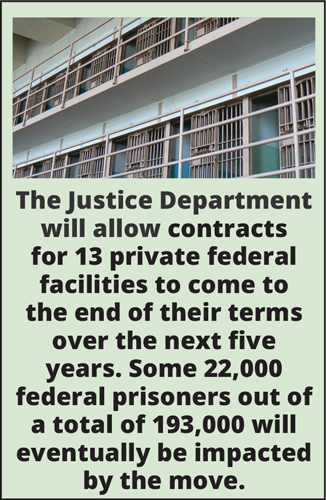Justice Department Cuts Back On Private Prison Use
By Askia Muhammad -Senior Editor- | Last updated: Aug 26, 2016 - 1:13:49 PMWhat's your opinion on this article?

|
Deputy Attorney General Sally Yates said the move away from private prisons has been on the table for months. “The fact of the matter is, is that private prisons just don’t compare favorably to the Bureau of Prisons in terms of safety or security or the services that they offer to the inmates there. The Bureau of Prisons does a better job,” Ms. Yates told reporters.
The Justice Department will allow contracts for 13 private federal facilities to come to the end of their terms over the next five years. Some 22,000 federal prisoners out of a total of 193,000 will eventually be impacted by the move.

|
“Our criminal justice system is broken and in need of major reforms,” Sen. Bernie Sanders (I-Vt.) said in a statement. “The Justice Department’s plan to end its use of private prisons is an important step in the right direction. It is exactly what I campaigned on as a candidate for president.”
“I applaud the directive of the Deputy Attorney General that the Federal Bureau of Prisons reduce its reliance on and ultimately cease the use of private prisons,” Rep. John Conyers (D-Mich.), Dean of the Congressional Black Caucus and Ranking Member of the House Judiciary Committee said in a statement. “Private, for profit prisons create perverse and counterproductive incentives that only worsen our crisis of over incarceration. Furthermore, they are too costly and often perform poorly at humanely housing prisoners, providing competent medical treatment, and offering programs to reduce recidivism.”
“Today, for-profit companies are responsible for approximately 6 percent of state prisoners, 16 percent of federal prisoners, and inmates in local jails in Texas, Louisiana, and a handful of other states,” Rep. Sheila Jackson-Lee said. “Out of 1.6 million people incarcerated, 128,195 are in private prisons without any legal rights regarding complaints and incidents, according to the National Council on Crime and Delinquency. These private prisons have also been linked to numerous cases of violence and atrocious conditions,” she continued.
“Privately run prisons have a long record of being less safe and providing fewer resources and opportunities than publicly run institutions,” AFL-CIO President Richard Trumka said in a statement. “Our criminal justice system can never be fair while there is money to be made in locking up individuals. The entire labor movement will continue to fight until all incarcerated people are treated with dignity and every man and woman who works inside a correctional facility is safe on the job.”
“It is an international embarrassment that we put more people behind bars than any other country on earth,” Sen. Sanders said. “Due in large part to private prisons, incarceration has been a source of major profits to private corporations. Study after study after study has shown private prisons are not cheaper, they are not safer, and they do not provide better outcomes for either the prisoners or the state.”
Over the next several years, the Federal Bureau of Prisons will have to start shutting down its private prisons. “Few people know that the federal government has established, over the last two decades, a sort of subsystem of federal private prisons used exclusively to hold noncitizens convicted of federal crimes,” investigative journalist Seth Freed Wessler told “Democracy Now!” “And these prisons have been the sites of repeated protests by prisoners. As I’ve documented in my reporting, and, as I found in an investigation for The Nation, deep and systemic failures to provide baseline levels of care to prisoners held inside, dozens of deaths of men who are held in these facilities, after substandard, negligent medical care.
“And I spoke yesterday to the relatives, actually, of several men who died inside of these facilities after pretty extreme kinds of medical neglect. Both of those families said that they felt that this decision to close these facilities brought some kind of justice, if too late for them. It’s a big decision,” Mr. Wessler said.
INSIDE STORIES AND REVIEWS
-
-
About Harriett ... and the Negro Hollywood Road Show
By Rabiah Muhammad, Guest Columnist » Full Story -
Skepticism greets Jay-Z, NFL talk of inspiring change
By Bryan 18X Crawford and Richard B. Muhammad The Final Call Newspaper @TheFinalCall » Full Story -
The painful problem of Black girls and suicide
By Charlene Muhammad -National Correspondent- » Full Story -
Exploitation of Innocence - Report: Perceptions, policies hurting Black girls
By Charlene Muhammad -National Correspondent- » Full Story -
Big Ballin: Big ideas fuel a father’s Big Baller Brand and brash business sense
By Bryan Crawford -Contributing Writer- » Full Story






 Click Here Stay Connected!
Click Here Stay Connected!








